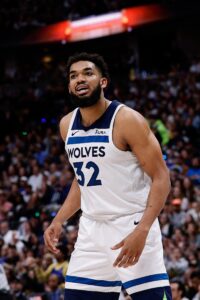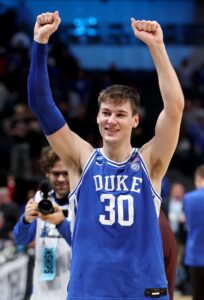Exactly one year after the Bucks, Trail Blazers, and Suns completed a blockbuster trade involving Damian Lillard, Jrue Holiday, and Deandre Ayton, the Knicks and Timberwolves – with the help of the Hornets – were on the verge of finalizing a blockbuster of their own on Friday.
 According to reports, Karl-Anthony Towns is headed to New York in exchange for a package that includes Julius Randle, Donte DiVincenzo, Keita Bates-Diop, and a protected first-round pick.
According to reports, Karl-Anthony Towns is headed to New York in exchange for a package that includes Julius Randle, Donte DiVincenzo, Keita Bates-Diop, and a protected first-round pick.
Our full story includes more details and analysis on the pending trade, but I want to focus here on what the deal will mean for the Knicks from a cap perspective in 2024/25.
Remember, the Knicks are already operating above the first tax apron and hard-capped themselves at the second apron in July by aggregating salaries in order to acquire Mikal Bridges from Brooklyn. A team that aggregates salaries in a trade isn’t permitted to surpass the second apron line of $188,931,000 for the rest of the 2024/25 league year.
Meanwhile, a club operating over the first apron can’t take back more salary than it sends out in a trade, which means the Knicks need to get to at least $49,205,800 in outgoing salary — that’s Towns’ cap hit for ’24/25.
So far, we know New York is sending Randle ($28,939,680), DiVincenzo ($11,445,000), and Bates-Diop ($2,654,644) to Minnesota. That works out to $43,039,324, meaning the Knicks need to add another $6,166,476 to the deal.
They’ll get about halfway there by signing-and-trading DaQuan Jeffries to Charlotte. His new contract will reportedly start in the neighborhood of $3MM, leaving the Knicks with another $3MM-ish to send out for matching purposes.
Bobby Marks of ESPN reported on Friday night (via Twitter) that Miles McBride isn’t being included in the Knicks’ package. The club also can’t add any more minimum-salary players to its package due to a rule that prevents teams from aggregating multiple minimum-salary contracts in bigger deals during the offseason. And it seems relatively safe to assume that key rotation players like Josh Hart and Mitchell Robinson aren’t being included or else that would have been reported already.
That leaves two options for the Knicks. They can get to the necessary salary-matching threshold by also sending out rookies Tyler Kolek ($2.09MM) and Pacome Dadiet ($1.81MM). But the preferred solution would be to sign-and-trade another player to the Hornets or another team, giving that player a salary in the $3MM range.
The Knicks still have cap holds on their books for Charlie Brown and Duane Washington, who both finished last season on two-way contracts with the team. Washington is playing for KK Partizan in Serbia, so Brown is the more logical sign-and-trade candidate.
Using his Non-Bird rights, the Knicks could give Brown a starting salary worth up to $2,685,229, which means Jeffries’ starting salary would need to be $3,481,247 in order for the club to reach the required outgoing salary total. In theory, that’s doable, since New York holds Jeffries’ Early Bird rights. However, base year compensation rules would apply to Jeffries in that scenario, meaning his full salary wouldn’t count for matching purposes.
In order to reach the matching threshold using Jeffries and Brown, the Knicks would have to bump Jeffries’ first-year salary all the way up to $6,962,494 — under BYC rules, his outgoing salary would count for 50% of that amount ($3,481,247).
But since Jeffries’ first-year salary was reported to be in the $3MM range, the plan may be to sign-and-trade him at that lower figure ($2,910,484 would work without triggering BYC rules) and add one more player to the package. Maybe it’ll be Kolek or Dadiet, or maybe the Knicks will figure out a way to extract Washington from his contract with Partizan in order to sign-and-trade him too. We’ll see.
The Hornets, meanwhile, are in position to take on Jeffries – and maybe Brown as well – without sending back any salary using their $8MM room exception. They would be the first team to take advantage of the new rules allowing teams to use certain exceptions (the non-taxpayer mid-level, the room, and the bi-annual) to acquire salary in a trade.
If we assume the trade is completed using Randle, DiVincenzo, Bates-Diop, and signed-and-traded players, the Knicks would be left with $185,351,521 in total salary for just 12 players. Their hard cap for the season is $188,931,000. That leaves just $3,579,479 in wiggle room, which is a bit of an issue.
The cap hit for any veteran free agent signing, including camp invitees like Marcus Morris, Landry Shamet, and Chuma Okeke, is $2,087,519. Rookies or players with just one year of experience can have smaller minimum-salary cap hits, but they still count for tax and apron purposes as $2,087,519 players. That “tax variance” rule is meant to prevent teams from passing over veteran free agents in favor of younger ones solely for financial reasons.
Carrying two minimum-salary free agents into the regular season would cost over $4MM for apron purposes, pushing the Knicks above their hard cap. So that won’t be possible unless the team makes another salary-shedding trade that would cost them a rotation player. There’s no indication that’s the plan.
The Knicks could start the season with just 13 players on standard contracts, but they’d only be allowed to do that for up to two weeks before being required to add a 14th man.
So what are their options for that 14th roster spot? Again, assuming they don’t make another cost-cutting trade, the only real possibility for the Knicks would be to sign or convert a former second-round pick to a standard contract. Since the tax variance rule only applies to free agents, a Knicks second-round pick who signs a minimum-salary deal would count as $1,157,153 for cap, tax, and apron purposes.
New York holds the draft rights to a ton of non-NBA players, but the most viable NBA options on that list, including Mathias Lessort and Rokas Jokubaitis, are already under contract with teams in other professional leagues.
That means the more likely path for the Knicks, as Bobby Marks of ESPN tweets, is to convert one of their current two-way players to a standard contract. Kevin McCullar and Ariel Hukporti both signed their two-way deals after being drafted by New York, so either player would be a candidate for a promotion. Jacob Toppin wouldn’t be, since he signed his two-way contract as a free agent, meaning the tax variance rule would apply to him.
Let’s say the Knicks complete the Towns trade as we outlined above, retain either Morris, Shamet, or Okeke to start the season, then promote McCullar or Hukporti to a standard contract 14 days into the season. In that scenario, the team’s salary would be right around $188.5MM for 14 players, giving them approximately $428K in wiggle room below their hard cap for the rest of the season.
The Knicks’ ability to make in-season moves, including adding a 15th man, would be severely limited in that scenario. But their roster would be legal, which is the primary concern at this point.
New York could generate slightly more breathing room below the second apron hard cap by including either Kolek or Dadiet in their package for Towns, then promoting both McCullar and Hukporti to the standard roster on minimum deals.
As was the case with the Bridges trade earlier this summer, early reporting has let us know the most significant pieces in this deal, but there are still some intriguing loose ends to be tied off in order to make it work.
 According to reports,
According to reports, 